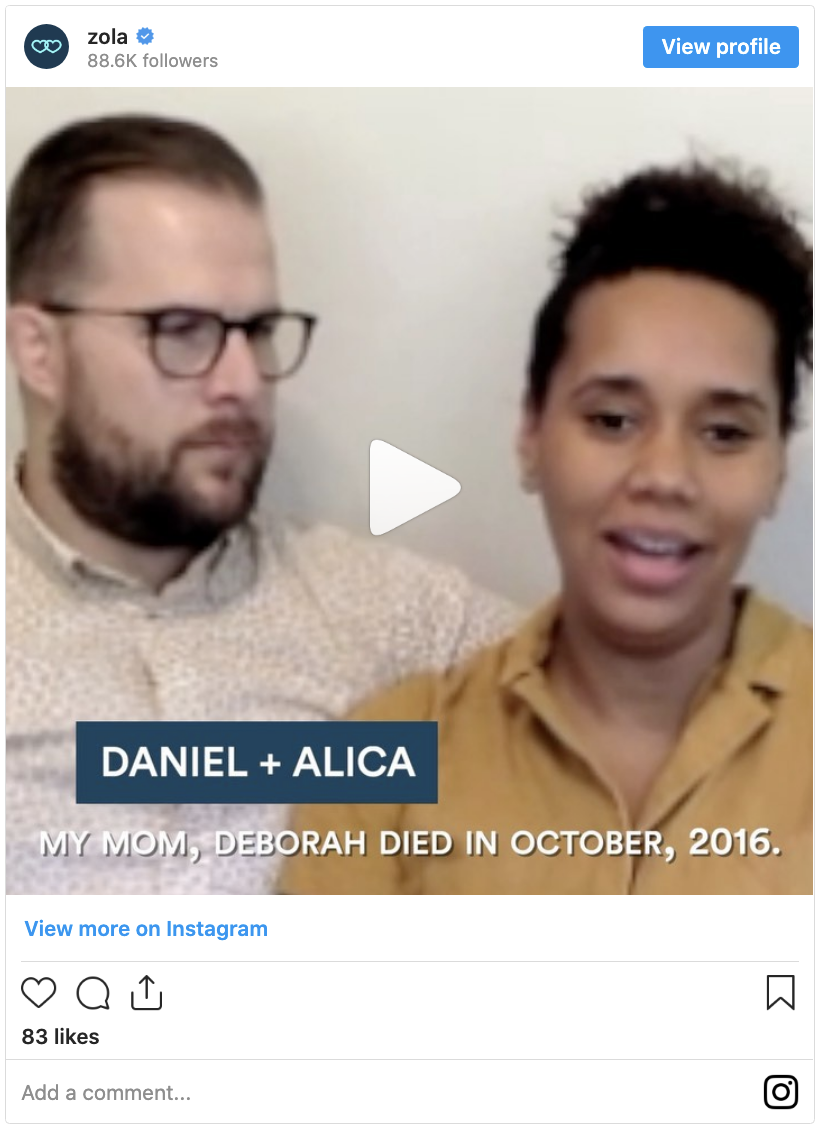- Expert advice/
- Wedding planning 101/
- Wedding planning questions/
- What to Expect When Planning a Wedding While Grieving
- Wedding planning questions
What to Expect When Planning a Wedding While Grieving
Grief experts at Lantern sit down with four Zola couples to get their take on dealing with grief during wedding planning, plus offer advice to those looking to honor their loved ones during their big day.
Last updated February 5, 2024
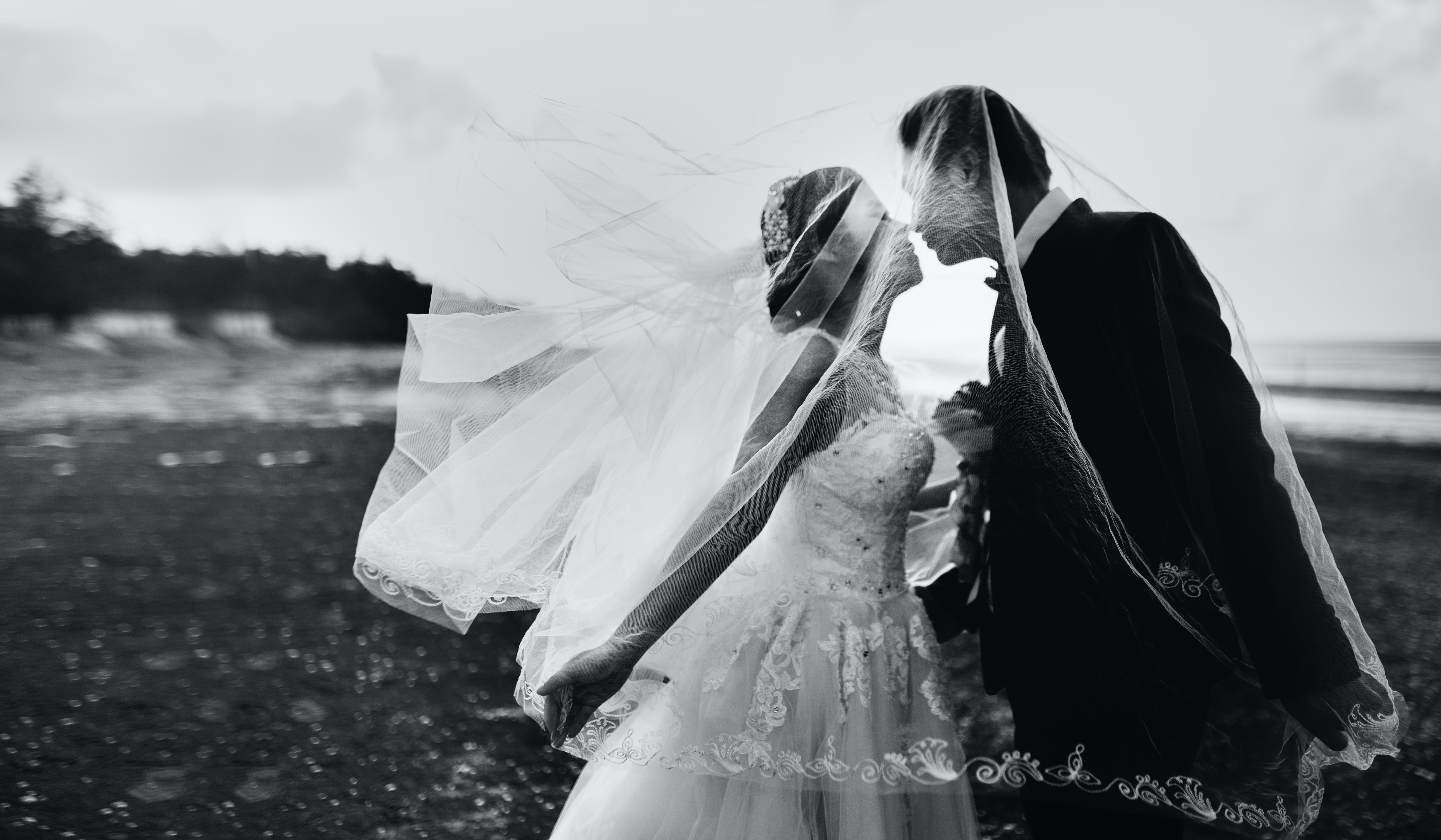
The First Look ✨
- Loss of a loved one can impact the wedding planning process in many ways.
- Support your partner and let your emotions flow at your wedding.
- Things like putting out pictures, incorporating traditions, and saying their name out loud can help pay tribute to them on your wedding day.
- Lantern can help you manage your grief from the time you are planning your wedding and beyond.
Losing a loved one is never easy, no matter how long it’s been since they passed. Little things, such as a perfume scent or favorite food, may trigger memories of them. Then there are more significant events, such as birthdays, anniversaries, and your impending wedding day, that will definitely bring them to mind. From planning seating charts to selecting your wedding attendants, you may be constantly reminded of their absence while planning one of the most meaningful days of your life. And you’re not alone.
Partnering to Help Couples Manage Grief
While you will undoubtedly miss them on the big day — and it’s ok to feel that way — Zola realizes that many of our couples have lost relatives and close friends. That’s one reason Zola partnered with our friends at Lantern, a source of guidance for navigating life before and after a death, to share stories and advice around wedding planning amid grief.
Four real-life couples who experienced loss, including losing parents and other close relatives, provided their take on dealing with grief. From navigating the wedding planning process to permitting yourself to let emotions flow on the day of, here’s what those couples had to say. Their sage advice lets you know that you’re not alone, so let their experiences encourage you as you plan and look forward to your union.
Watch the full interview here.
How Loss Impacts the Wedding Planning Process
As you meet with vendors, select your wedding attire, and formulate your guest list, your loved one will naturally come to mind. Here’s what that looked like for our four couples.
Their absence is something you may have already considered.
Claire and Joe wed in March of 2022, and although Claire is an only child, she was incredibly close to her cousins, one of whom passed away in 2016. “After I found out about my cousin passing, one of the first thoughts I had was that he wasn’t going to be at my someday wedding,” Claire reminisces. Although she hadn’t even met Joe yet, she realized that someone she cared about deeply wouldn’t be able to share in her big day.
Loss may be felt throughout the wedding planning process.
Emily and Danny had both lost parents — Emily’s dad passed when she was ten years old, and Danny lost both parents in his 20s — and their absence was felt. Emily says, “Grief was woven into every single aspect of our wedding planning process.” It caused her to think about what their parents would have wished for their big day. Things like where to get married, the type of wedding, and who to invite all caused her and Danny to ponder their losses.
Honoring your loved one on your big day will be a priority.
Having your mom miss out on the planning process is difficult, especially when you’re picking out a dress and making other plans. Unfortunately, this void is exactly what Alica and Daniel experienced for their September 2019 wedding after Alica’s mom passed in 2016. How to honor Alica’s mom weighed heavily on them during the planning process, although their planner and celebrant helped with ideas.
Small tasks may bring the loss to the forefront of your mind.
Even though it had been a few years since Claire’s cousin passed, she couldn’t help but think of him when she was doing wedding-related tasks, such as making the guest list, addressing invitations, and planning a seating chart that included a cousins’ table. “It kind of forces you to think about the person who is missing or who will be missing,” Claire adds.
Supporting your grieving partner is a must.
Although Alica was the only one who had experienced loss of a close fmaily member, Daniel supported her every step of the way. “What I experienced while we were planning was a real awareness of Alica and trying to be mindful of the fact that we were both going to do something we’ve never done before — and someone significant was missing,” says Daniel. Being there for your partner is essential, even if you don’t fully understand their loss.
Be there for each other while planning your wedding.
If you’ve both experienced loss, such as with Daniela and Phil, you’ll need to support each other while also practicing self care. Daniela lost her dad when she was 10, and Phil’s mom passed away almost two years before their March 2022 wedding. “It’s important to have sensitivity to each other,” advises Daniela. “We both experienced big losses but at very different times of our lives.” Although they both understood grief, the process looked different for each of them.
Lean on other family members to get through.
In Latin culture, it’s typical for the mom to walk the son down the aisle and for the daughter to be accompanied by her dad. Therefore, everything needed to be rethought, such as family photos, first dances, and the processional. “Having to go through all of those details was super important,” says Dani, but family was there to help. Phil notes, “My mom would have been a part of a lot of the planning, so I leaned a lot more on my family leading up to the wedding.” Realize that traditional plans may change, but your family can help you get through.

How Grief Impacts the Wedding Day
It is natural to wonder what will happen in the days leading up to your wedding. Of course, each individual’s experience is unique because we all process grief differently. However, here is what our couples had to say.
Sadness may creep in when you least expect it.
For Alica, having someone by her side the entire day who understood her experience was vital. So, she chose a photographer who had also lost her mother before her big day. The connection between the two was necessary when Alica unexpectedly cried while alone with her photographer during pre-wedding photos. “I just burst into tears,” says Alica. “She just let me be. She let me cry and let me have my moment.”
Realize you can’t change the circumstances.
Shifting focus to honoring your loved one can sometimes be the best way to deal with grief during your wedding, which is what Claire decided to do. She had more trouble during the wedding planning process, but she decided to turn her grief into honoring her cousin instead. “The day of the actual wedding, I told myself that I can’t change this,” she says. “I can’t bring him back. The best thing we can do together is to honor him and be happy.”
Remember that it’s your wedding day.
Emily and Danny knew that the day would have an element of sadness. However, they also realized that it was their special day. “Danny and I wanted to remember the day as something light because there was obvious deep sadness with people missing,” says Emily. Don’t be afraid to celebrate on your big day. “The day itself was an especially happy day. Both our families really came together, and it was a very joyous day,” Danny adds.
Look for signs throughout the day.
Interestingly, half of our couples experienced a sign — specifically birds — during the ceremony. For example, Emily and Danny had three birds fly over the chuppah during the wedding. To them, this symbolized their three passed parents giving their blessing. “I think that’s a special piece that I like to see as a sign,” reminisces Emily. “Ultimately, I look back on my wedding day as something special and magical.”
Daniela and Phil had a similar experience as they were saying their vows in a Cartagena cathedral. Although the doors were closed, they experienced a rare sighting. “There were two white doves in the cathedral that were right by the altar,” reflects Danny. “We saw it as a symbol.” To them, the two birds symbolized their two passed parents.
Creative Ways to Memorialize Your Loved Ones
Your wedding day allows you to do things in memory of your lost loved ones. Planning something unique can help manage the grief you feel while acknowledging your loss. Here are unique ways our four couples paid tribute to their loved ones who had passed.
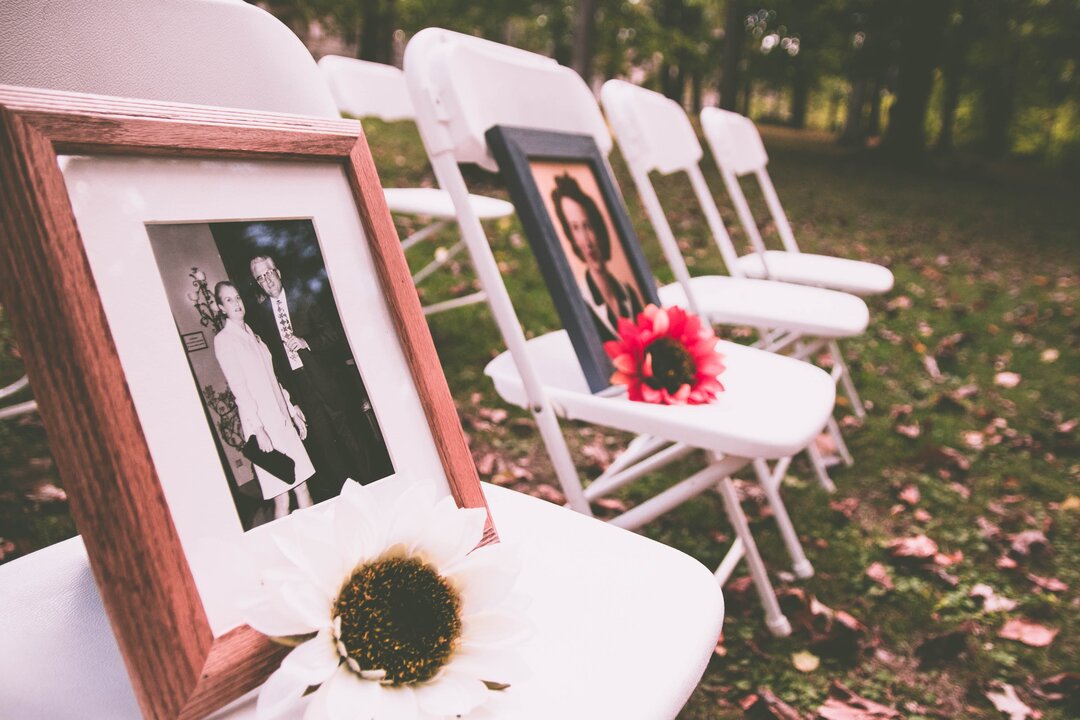
Incorporate their religious preferences.
Emily and Danny wanted to include their religion in their wedding to honor their parents. Instead of having one officiant, they chose to have both of their rabbis from their childhoods. Doing this allowed for someone familiar — and who knew their parents — to speak about them, which was a beautiful way to pay tribute. “We’re not particularly religious people but the Jewish aspect of incorporating our parents felt the most natural,” reminisces Emily. They also put both of their fathers’ tallits over their chuppah during the wedding ceremony.
Wear something to help you remember.
In a sweet display, Claire’s aunt gave her a necklace at her wedding shower. It was a pendant that included her favorite colored stone, and the back was engraved with her cousin’s name and the date he passed. With a turquoise stone, it became her something blue.
Create a mini-memorial of your loved one.
Photos are always lovely to include on your big day, and Daniela and Phil had a small memorial table. “We had two images that were dear to our heart at the entrance,” remembers Daniela. “We had a candle and their favorite drinks there.” A visual tribute gave family members a moment to remember while introducing the lost loved ones to those who hadn’t met them.
Incorporate a ring warming.
On Alica and Daniel’s special day, they decided to incorporate a blessing. So their parents’ wedding rings were placed in a bag and passed around during the ceremony. “Guests would take a moment silently during the ceremony to send good wishes, warm the rings, and put good energy into the rings,” remembers Alica. “It was a way to honor the relationships and the marriages that had come before us.” After guests warmed the rings, the couple put them on.
Turn clothing into a memorial.
Danny decided to do something incredibly creative, although private, for the big day. He had an artist digitally print a fabric collage that included photos of their parents. Then, the memorial was sewn onto the inside of the suit jacket. It was a hidden tribute to their losses yet could be shown if folks wanted to see the art piece.
Speak the names of lost loved ones.
Sometimes the best way to acknowledge a loss is to mention it, mainly if this includes speaking the person’s name. Alica and Daniel had their officiant read the names of loved ones who couldn’t attend, and the response was surprising. Everyone clapped and cheered while the officiant read the names aloud. “It was a really good energy to start with, and to have their names spoken in the room was recognition of them and the loss,” Alica recalls. It set the tone for the day and permitted guests to talk about her mother. She adds, “The thing that really touched me was how people weren’t afraid to acknowledge the fact that she was gone.”
Include a tribute in the wedding bouquet.
Daniela had also lost her grandad, so she had three pendants on her bouquet. They chose the photos together, and it was special to reminisce while selecting images to put on her bridal bouquet. “Having that there was so important,” she says. “I felt like all three were with us in that special moment.”
In another tribute display, Claire carried a small amount of her cousin’s ashes in a vessel attached to her bridal bouquet. “I was able to walk with him down the aisle,” she says. While they were going into their reception, the vial was falling off, so she decided to wear it during the cocktail hour, which further helped Claire cope with her loss. “It really helped me feel closer to him on the wedding day,” she says.
Plan something before the big day.
Covid caused Daniela and Phil to change their wedding date, so their big day was one day shy of the second-anniversary date of Phil’s mother’s death. They knew they needed to acknowledge her passing, so they did it the day before their wedding. “We did a small, private mass with immediate family on both sides in remembrance of her,” says Phil, adding that it put a positive spin on their wedding. “It put everybody in a good headspace to have that day for her and then turn the page and celebrate the next day, so it ended up working out beautifully.”
Advice from Our Couples on Dealing With Grief
Whether it was advice given to them or wisdom based on experience, here’s what our couples had to say. Let their tips encourage you throughout your planning process and on your special day.
Allow yourself to feel what you feel.
Whether tears creep up or you feel overcome with joy, accept your emotions without judgment. “Go with the flow. If it’s sad in the moment, be sad. If it’s happy in the moment, be happy,” advises Phil. “There’s no forced reason to be upset, but if you have that feeling, just go with it.”
Think of the person being there in spirit.
One piece of advice Claire received from her therapist was to reflect on her cousin throughout the day. “To just remember him and remember that he is there with me,” she says. “I felt like he was with us in spirit.”
Break the rules.
It’s your day, so don’t be afraid to border on the nontraditional. “There aren’t any right or wrong ways to get married or have a wedding,” says Danny. “Especially with the messiness of grief, even more so you’re allowed to break the rules. Create your own script on how you want your wedding day to be.”
Choose a way to honor them that is meaningful to you.
Others may weigh in, but ultimately it’s up to you how you remember them on your big day. “You can hear a lot of different advice, but think about how you would want to remember the person and as a couple how you want that to play throughout the day,” recommends Phil.
Be patient with yourself and with your partner.
Joe advises, “Be patient with your partner. Grief is not just something that you get over in one day, one month, one year. It’s an ongoing process. You’ll have good days. You’ll have bad days. Just be there to support and to remind them that no matter what, the feelings you harbor are valid. Take it one step at a time.”
Find meaning in your loss.
One thing that helped Claire was to focus on what she learned to be called “the sixth stage of grief”, which is finding meaning. She asked herself questions to get through. How do you move forward in your life? How do you create meaning? How do you honor them? “The best thing that I could do for Aaron was to make sure that our wedding day was the best it could be,” she says while adding that she also spent extra time with her cousins as though he was there.
Realize that your big day only happens once.
“You get the day once, and it’s there to enjoy it,” says Daniel. “Ignore fears about what others think. Relax and enjoy. Look out for each other and have the day you want.” You don’t want the day to go by without it being all you envisioned.
Communicate with your partner.
As with any relationship, being honest and vulnerable is crucial. “Communication is key,” offers Phil. “Remember that the day is for both of you, even if it’s only one of you that has experienced the loss.”
Cherish your other relationships.
Claire’s loss caused her to dive deeper into her current relationships. “Honestly, grief has made me think about who you value in your life, who you give your time, love, and energy to, and the importance of keeping up with your loved one,” she reflects. She now checks in with friends and relatives, especially if she knows they are having a rough time. “Think about who you really want there, who you couldn’t imagine the day without and then you really cherish and hold on to those relationships,” she adds.
Know the purpose of the day.
Getting married to the one you love is the ultimate goal for the day, which is something Emily stresses. “At the end of the day, you are here to marry the person that you have chosen to build your life with — let that be your North Star when you’re planning your wedding and your life moving forward after that.”
Let Lantern Help
For everything from planning your future to managing a loss, Lantern is there to help guide you through difficult times. Losing a loved one always looks different for each person. So whether planning your wedding or preparing for your future, consult Lantern at Lantern.co for your end-of-life needs.
Up next for you
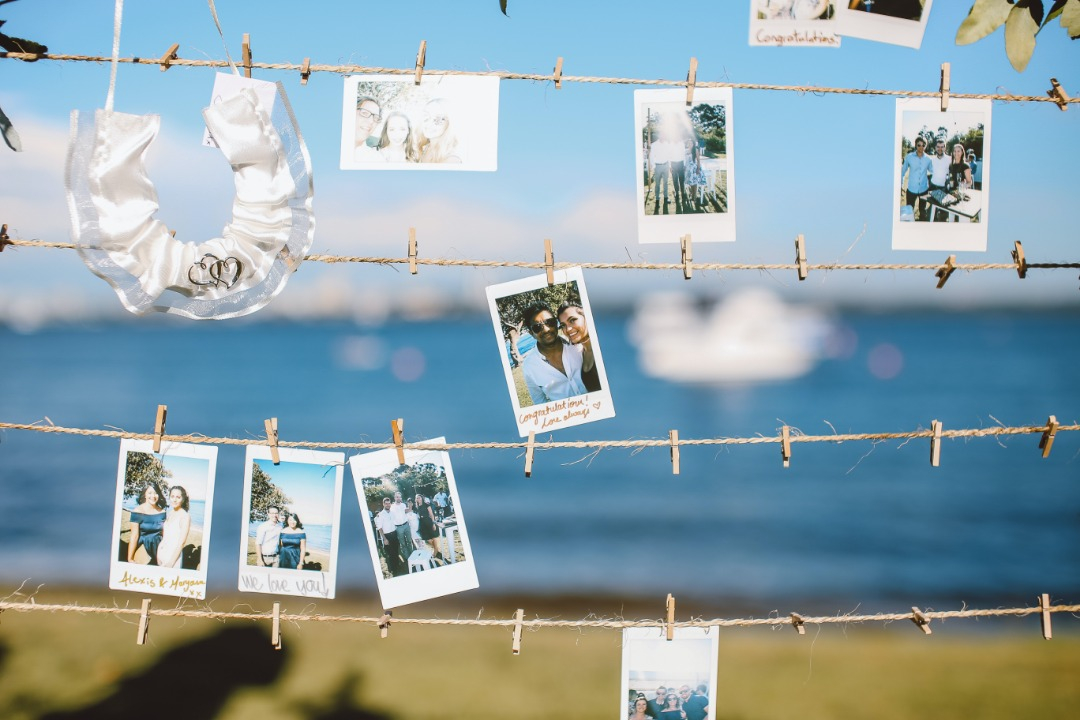
How to Navigate Wedding Planning in the Midst of Grief
Inspiration
Your wedding day is one of the happiest in your life, but missing a loved one can make it difficult. We've partnered with Lantern to bring you expert advice on how to make this process easier.

How to Include Your Wedding Website on Your Invitation
How-To
Wondering how to share your wedding website with guests? Explore etiquette tips for how to share your wedding website on an invitation.

56 Unique Wedding Memorial Ideas to Honor Loved Ones
How-To
Honor cherished memories at your wedding with thoughtful memorial ideas. Create a meaningful tribute to late loved ones on your special day.
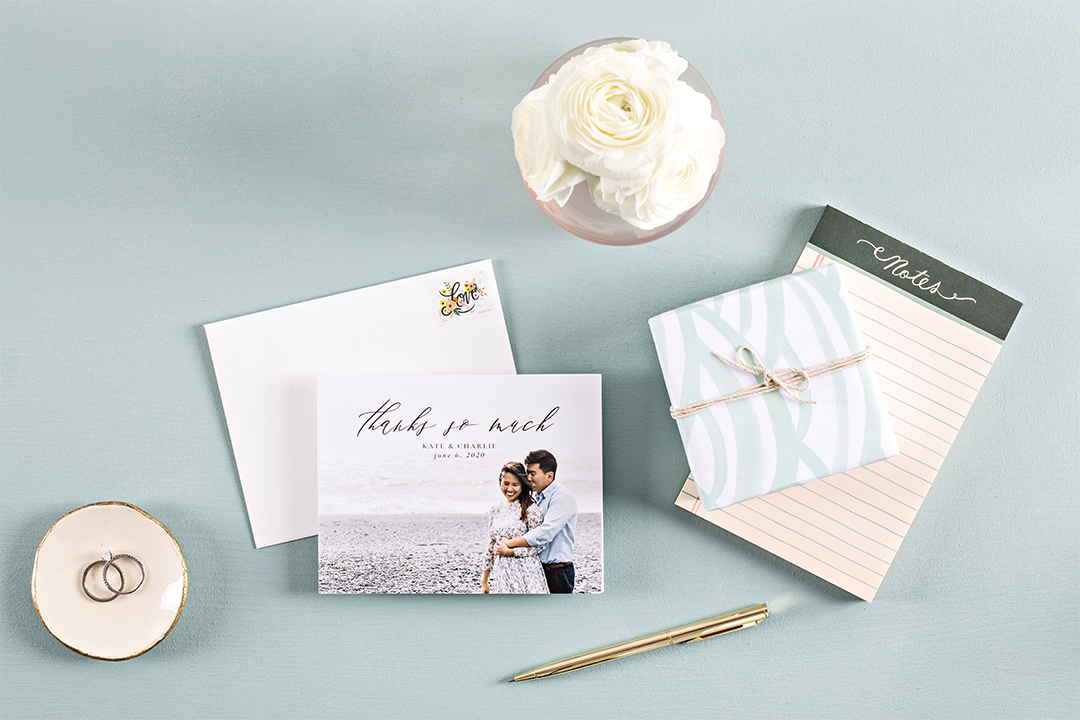
Wedding Thank You Cards–When To Send Them, What To Write, And More
Advice
Do you know when to send wedding thank you cards? We’ll break down this—and more—in our wedding thank you card guide.
- Expert advice/
- Wedding planning 101/
- Wedding planning questions/
- What to Expect When Planning a Wedding While Grieving
Find even more wedding ideas, inspo, tips, and tricks
We’ve got wedding planning advice on everything from save the dates to wedding cakes.
